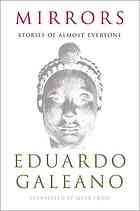
Mirrors
Stories of Almost Everyone
کتاب های مرتبط
- اطلاعات
- نقد و بررسی
- دیدگاه کاربران
نقد و بررسی

Starred review from April 13, 2009
The acclaimed Uruguayan writer Galeano offers another striking but hard to classify work—except in relation to his own oeuvre: this book being something like a companion piece to Book of Embraces
or his three-volume Memory of Fire
. In pithy retellings of creation myths and reflections on history, he uses the past to comment on the present: juxtaposing the origin of the Hindu caste system and the “untouchable” class, whose members were responsible for cleaning up the wreckage of the 2004 tsunami, revealing how the casualties of the invasion of Iraq were not only human but memory itself, embodied by the destruction of priceless artifacts from the birthplace of writing. These vignettes embrace the exalted and the humble, and consistently privilege the narratives of the dispossessed—indigenous people, women and accounts from the global south. Across disparate civilizations and centuries—but always with an unflinching eye (and irony) trained on the present—Galeano's stories register the imaginations of our mythmaking species, the elaborate gestures of (gendered) forms of power and the spirit of rebellion and resilience that fires the underdog masses.

April 1, 2009
From the noted Uruguayan author, a broad, global, sometimes glancing look at all the ways humans do wrong.
Galeano (Voices of Time, 2006, etc.) practically holds a patent on the telling of history via feuilletonistic vignettes, most running just a few hundred words. In this latest variation on the theme he established a quarter-century ago with his Memory of Fire trilogy, Galeano relates some 600 tales, ranging from the protohominid origins of humankind to the sad realization that the 21st century is likely to be no different than its predecessor,"born proclaiming peace and justice, died bathed in blood." In between is a whirlwind of emperors, pharaohs, soldiers, explorers, saints and sinners. Galeano also develops a few anticapitalist, universalist themes that are sometimes much too obvious—racism is bad; why is Balboa credited as the first man to see two oceans at once when surely some Panamanian Indian beat him to it; etc.—but most of which bear airing nonetheless. In the latter regard, he hits his stride with a sequence of tales on the various ways in which the Devil has been depicted over time: as Muslim ("a great army of demons that grew larger with every blow of the lance, sword, and harquebus"), Jewish, black, female, poor, foreign, gay, Gypsy and/or Indian. Galeano's miniature essays are a hit-or-miss affair. When they hit, they make neat historical connections. When they miss, they sound familiar and tired, as when he writes,"In our days, George W. Bush, perhaps believing that writing was invented in Texas, launched with joyful impunity a war to exterminate Iraq."
Galeano's admirers will be content with this more-of-the-same approach to universal history; newbies may find it gimmicky. Either way, this new installment is worth a look.
(COPYRIGHT (2009) KIRKUS REVIEWS/NIELSEN BUSINESS MEDIA, INC. ALL RIGHTS RESERVED.)

Starred review from May 1, 2009
In his poetic nonfiction, Galeano performs the sort of extraordinary feats of compassion, artistry, and imagination achieved in fiction by his fellow visionary Latin American writers, especially Borges, Garc-a Mrquez, and Bolao. Galeanos seminal works, most notably Memory of Fire (1988), have been enormously influential in both content and form, and now this historian of conscience, this humanely ironic commentator and dazzling storyteller, distills the entire wild pageant of human history into a radiant mosaic of pithy fables, essays, and portraits. Galeano circles the planet, tallying our triumphs and crimes from cave paintings to genocide, gathering myths, exposing lies, and reclaiming forgotten heroes. Origin stories are a favorite subject, both authentic and impishly improvised, as in Origin of the World Trade Organization, in which Zeus chooses Hermes to be the god of trade because he was the best liar. Galeano is particularly ardent in his parsing of the perpetual injustice and violence against women, the perversion of religion and the habit of war, the horrors of slavery, the evolution of science, and the pillaging of the earth. Themes and connecting patterns rise up like waves and carry forward flotillas of essays in this gorgeously fluid andcaustic chronicle of the human condition.(Reprinted with permission of Booklist, copyright 2009, American Library Association.)

























دیدگاه کاربران